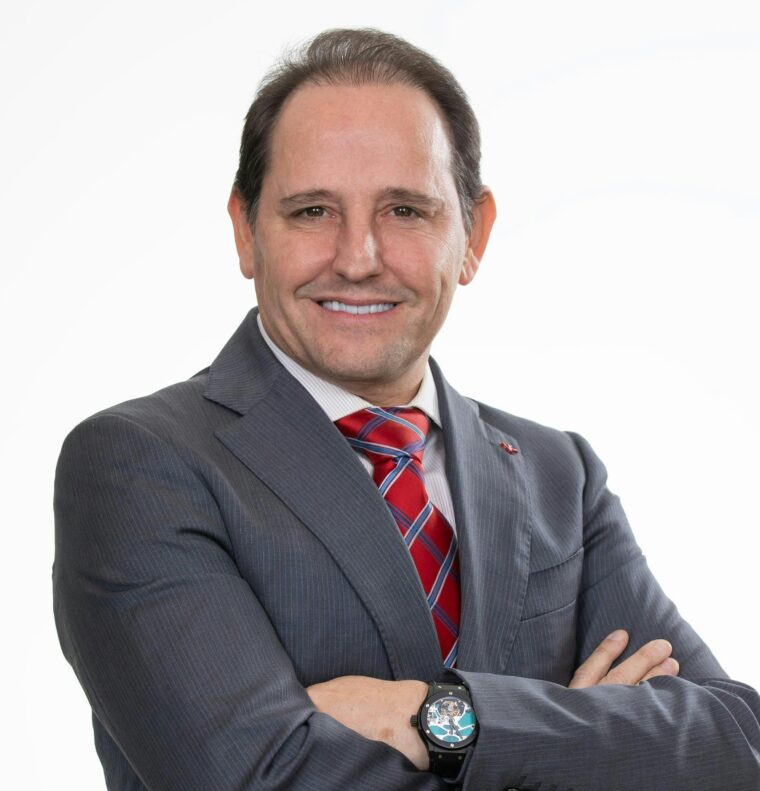Portuguese individuals who excel abroad help to identify business opportunities and the types of companies and activities that the country can attract. This initiative brings together Negócios and the Portuguese Diaspora Council.
1- What led you to leave Portugal?
I am part of the generation that left Portugal during the sovereign debt crisis in Europe. My departure, along with that of many Portuguese from my generation, was a consequence of the international financial crisis of 2008-09, triggered in the US by the so-called subprime crisis. At that time, the road ahead seemed difficult. I saw a horizon of macroeconomic recession, with reduced economic growth in the near future, and a decline in both private consumption, driven by the impoverishment of families and their disposable income, as well as in the ambition for growth at the microeconomic level, and in the life of companies. There was a combination of increased scrutiny on capital expenditures and investments, and especially an acceleration in channeling these investments outside of Portugal. It was there that Portuguese companies had to seek market, and it was there that investment would concentrate.
On one hand, I did not want to be part of the future “one thousand euros” generation that loomed, but I must confess that it was always my desire to have an international life. I always wanted to experience other cultures, see the world and “airports and hotels,” at least for a phase of my life. I started my career in a multinational company (Unilever) that provided me with that experience; later, I moved to a Portuguese company (Sovena Group) with a focus on the domestic market… but I wanted more.
2- What advantages or disadvantages did being Portuguese bring you?
Starting with the advantages: being Portuguese is being a discoverer. It means having the spirit of knowing that Portugal, as a territory, is small, but increasingly believing that the strength of the Portugal brand is greater than our historical and territorial size. We have talent, ambition, a willingness to work, and a responsibility to help our country. I always tried to live these expatriation years remembering these values and attitudes.
Specifically, and now more related to my industry, I work in fast-moving consumer goods, particularly in the category of olive oils and edible oils. Portugal is a world player in the olive oil sector. It is strategically located in the Mediterranean basin where this industry originated, and in the edible oils market, it is a small consumption market with a tradition of good fried foods such as pastries, where I highlight the codfish cake and the beloved shrimp rissoles, croquettes, and patties, present at any snack-bar counter. Being Portuguese here means knowing these categories and food products.
Disadvantages: Although respected, Portugal is a small country with a limited corporate tradition and the ability to generate global and multinational companies. Our culture is sometimes inward-looking, and we tend to view the world and other cultures through our own reality and experiences. We are small and sometimes lack humility and empathy.
3- What obstacles did you have to overcome and how did you do it?
The biggest obstacle is always the longing for what we leave behind. Family, friends, habits, and lifestyle of Portugal and being Portuguese. Nowadays, this longing can be mitigated through more frequent travel, mobile phones, and social networks. Additionally, I always made a great effort to stay up to date with my country, read in Portuguese, and follow the main podcasts of news and debates about national politics.
Another way to stay connected to the country is by dedicating time to bridging the gap between the United States and Portugal. I have served as a member of the executive committee of the Portugal-U.S. Chamber of Commerce since 2015, and more recently on the Diaspora Council. These are ways to stay connected and contribute to my country of origin.
4- What do you admire most about the country where you are?
The United States of America is a great country. It is the world’s largest economy, with much land to traverse and explore. There is extensive logistics and long supply chains here. The market has about 340 million consumers, and the disposable income of families is higher than in the European and Asian markets. Specifically, regarding the food industry where I work, this is the largest consumer market (about 400 million liters of olive oil annually) and non-producer of olive oil in the world (production in California does not officially count towards the major producing countries, as it is very limited). There is much market to conquer here.
I also add a more macro view of this nation. The United States of America is an ideal in construction for 250 years and is not yet finished. This people steadfastly cling to the values of Liberty, Equal Justice for all, economic power based on a strong dollar, and unity around the sentiment of national security, expressed in respect for the American flag. It is a fascinating country.
5- What do you admire most about the company where you are?
Sovena Group is a family business, part of a group that has been operating in Portugal for 100 years (CUF Group), and is a world leader in olive oil volumes sold. We are talking about a Portuguese company that had the strategic vision and ambition to position itself in the food products sector – vegetable oils and olive oils – and early on left Portugal, its domestic market, and expanded its potential market from 10 million consumers to 8 billion. There are not many companies in Portugal that can present themselves as world leaders in a product category, such as the olive oil segment. We have an extraordinary team of people who contribute every day to the construction of this success story. We have cohesive leadership that bets on growing in international markets and we have internal career opportunities, aiming to bring this product category to more and more consumers around the world.
6- What recommendations would you give to Portugal and its entrepreneurs and managers?
Risking repetition in relation to many other managers, politicians, and thinkers, and falling into a cliché, my reflection, or appeal, is that Portugal needs a strategic direction and governmental and legislative stability. Only in a framework of trust generation will national entrepreneurs be able to invest in the domestic market, and especially attract investment from external investors. Portugal is a country with a capital deficit in its economy, so it will always have to be seen as a country attracting foreign investment.
7- In what sectors of the country where you live could Portuguese companies find clients?
I believe that the Portugal brand is in vogue here. Looking at the evolution of Americans’ perception of our country over the past 15 years, I would say that today they see Portugal as a modern country, with good conditions for safety and living. Americans value our integration into Europe and our geographical position. The American market has room for Portuguese food products. Here I speak from personal experience in the categories of olive oil, wines, frozen foods, among others. The tourism industry continues to value Portugal as a destination, whether in the “stopover” mode that has been around for a few years or as a destination as it feels today.
8- In what sectors of Portugal could companies from the country where you are want to invest?
Here I highlight agribusiness as a key sector for investment in Portugal. Land is still comparatively cheap, and we have excellent climate conditions and access to water (thanks to Alqueva, for example). Labor is also a factor to consider, both due to the excellent training of the workforce and the still competitive cost per hour, compared to the USA. Here the need is to make strategic, sustainable investments that respect the local ecosystem.
9- What competitive advantage of the country where you are could be replicated in Portugal?
Here we could extend the discussion, as I can point out several, but I will choose leadership skills. In the USA, there is a culture of team building and leadership that shapes the leader to be less involved in the day-to-day business and company and to do what is his role: lead a team of people. What seems obvious sometimes is not. In Portugal, leaders are still very focused on doing, very focused on “holding their place,” instead of growing the teams. I believe a leader exists to form a high-performance team, where everyone is aware of their role, and all strive for the same goal, to the point that the leader is no longer needed in that team.
10- Do you plan to return to Portugal? Why?
I am married and have two daughters: one 5 years old and the other 3 years old. Both my wife and I are Portuguese and have lived outside Portugal for many years. We believe that at this stage of our daughters’ education, being in New York and the USA provides them with a broader education, a set of stimuli to accelerate their development, which they probably would not have if we were in Portugal. For now, we are well where we are. We also know that one day we want them to grow up close to family, in a Portuguese-speaking environment, so returning is inevitable. We are both expatriates and very grateful for the experience, but like all good things in life, it has a beginning, middle, and end.







